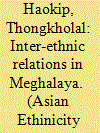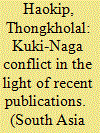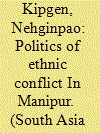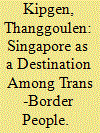| Srl | Item |
| 1 |
ID:
131611


|
|
|
|
|
| Publication |
2014.
|
| Summary/Abstract |
The Indian state of Meghalaya, since its creation in 1972, had been raven by ethnic conflicts between the indigenous tribes and settler non-tribal communities. The domination of business establishments, labour force and other employment opportunities by settlers who are mainly economic migrants from Bangladesh, Nepal and other parts of India resulted in anxiousness among the native locals, resulting in three ethnic riots between indigenous tribals and settler non-tribal communities. By the turn of the twentieth century the state witnessed a relative change in the nature of relations between the ethnic communities. While the relations between the indigenous tribals and settler communities have relatively improved, ethnic tensions shifted to the indigenous tribes. This article uses the perceived threat hypothesis and a combination of rational choice theory and interpretivism to explain empirically observed realities in Meghalaya. Emphasis is placed on the post-1992 period, focusing on the emerging ethnic relations between the indigenous tribes of Meghalaya.
|
|
|
|
|
|
|
|
|
|
|
|
|
|
|
|
| 2 |
ID:
117929


|
|
|
|
|
| Publication |
2013.
|
| Summary/Abstract |
This brief article critically reviews various recent essays and publications on the Kuki-Naga conflict of the 1990s. The conflict has resulted in uprooting hundreds of villages, with the loss of more than a thousand lives, destruction of valuable properties and internal displacement. While British colonial policies of governance in Northeast India and the rise of ethnic nationalism among Kukis and Nagas in the post-independence period have been identified as major root causes of the Kuki-Naga conflict, the literature remains inconclusive and this article argues that today competing claims and perceived threats regarding land and territory appear to be the major cause of continuing tensions.
|
|
|
|
|
|
|
|
|
|
|
|
|
|
|
|
| 3 |
ID:
117925


|
|
|
|
|
| Publication |
2013.
|
| Summary/Abstract |
This article analyses the conflict between the Kuki and Naga ethnic groups in the state of Manipur in North East India and attempts to understand why tensions arose in the first place and remain today between the two ethnic groups despite the formal cessation of hostilities in 1997. This ethnic conflict is shown to be a consequence of a lingering identity problem, aggravated by land disputes and equivocal responses of the state. It is argued that continued land disputes, the Nagas' unwillingness to perform Kuki customary rites and the government's indifference to the problem prevent these two groups from reaching a sustainable solution.
|
|
|
|
|
|
|
|
|
|
|
|
|
|
|
|
| 4 |
ID:
189551


|
|
|
|
|
| Summary/Abstract |
This article analyses the significance of kinship and ethnic networks in the migration of the Kuki people from the Indo-Myanmar borderland to Singapore. In addition to facilitating the dissemination of information and the formation of collective decisions, kinship and ethnic networks are crucial in fostering a sense of community and belonging in the new destination. The article investigates the church’s function among Singapore’s Kuki population. It argues that religion deconstructs ‘otherness’ that came about when colonial rulers split the Kukis into two separate countries (India and Myanmar). The church serves as a powerful symbol of Kuki identity since it facilitates efforts for ethnic unification and allows them to revive the sense of ethnic solidarity lost for decades.
|
|
|
|
|
|
|
|
|
|
|
|
|
|
|
|